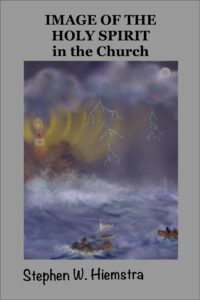Authors and Words

And God said, Let there be light,
and there was light.
(Gen 1:3)
By Stephen W. Hiemstra
If a crisis of authority—a replay of the reformation—is the core problem facing the church, then the Old Testament experience provides insight. Biblical faith starts with taking words seriously—God created the heavens and the earth with words—in a world where spin-doctors, advertisers, and half-truths undermine our confidence in what gets said.
Not incidentally, the root of the word authority is author—an originator or creator of something. The New Testament makes this point several times when it describes Jesus as the “author and finisher of our faith” (e.g. Heb 12:2, KJV). The Greek word in view—archenon (ἀρχηγὸν, BDAG 1154)—can mean: 1. one who has a preeminent position, leader, ruler, prince 2. one who begins something or 3. one who begins or originates. In a crisis of authority, one naturally defers to an authority.
Creation Language
Consider the third verse of Genesis cited above. The verse appears straightforward. That is, until you start to reflect on what is said.
The verse consists of three phrases: “And God said,” “Let there be light,” and “and there was light.” In English, the first phase is simply an attribution, as in a dialogue telling us who is talking. The second phase is an invitation. The third is a simple declaration. We are not told how the invitation morphs into a declaration.
The original Hebrew text is no help in understanding these three phases. Phases two and third state exactly the same thing: Be light and [there] be light (יְהִ֣י א֑וֹר וַֽיְהִי־אֽוֹר).
The grammatical description in my text (BDB 3570) describes the second phase as an apocopated jussive (abbreviated command), but that is likely an inference taken from the Greek translation in the Septuagint that utilizes an imperative form (γενηθήτω φῶς καὶ ἐγένετο φῶς). If it is a jussive, then why does not the text simply read: God commanded that light be created? It could easily but it does not.
The grammatical translation in English, as in Greek, expresses unusual politeness, as a parent might employ with a child and the subtext is ethical: What God says; God does. This point is underscored in verse four: “And God saw that the light was good.” (Gen 1:4). This form is repeated over and over in the creation accounts, which suggests emphasis and draws attention to the importance of words in the text.
Because we are created in the image of God and want to reflect his image, if God treats words as important, then we should too. This is context where we later witness the creation of Adam and Eve.
Words and Actions
What if we assume a promise, not an imperative, in translating the third verse in Genesis: Be light and [there will] be light? Grammatically, this is not a stretch but only an interpretation no different than that expressed in an imperative.
Jenson (1973, 2) writes: “A promise pose a future in a very particular way: as gift.” Creation is clearly a gift for Adam and Eve, And, by inference, for us. Jenson (1973, 8) interprets the Gospel as promise and views it as the grammatical anthesis of law.
“Because I will do such and such, you may await such and such. The pattern is ‘Because…, therefore…,’ the reverse of ‘If…,then…’ Here the future is opened independent of any prior condition…it grants a future free from the past.”
Viewing creation as a promise rather than an invitation is interesting thought experiment for two reasons. First, the hearer participates actively in the future event—a formative process—rather than remaining a passive observer of the past. Second, it permits us to observe the agent of formation, the Holy Spirit.
Unfortunately, treating the imperative as a promise is less helpful in discussing parallel verses in later creation events, suggesting that the current invitation translation is preferred. Nevertheless, we engage in thought experiments to tease out insights that deepen our understanding of the text, a kind of meditative exercise not unlike lectio divina (Peterson 2006, 91).
Other Promises
The biblical template for faith in an individual is a coming of age story that begins when Abraham acts on God’s promise (Gen 12:1-3). The biblical template for faith in a community begins with a promise to Moses: Deliverance, freedom, and land (Exod 3:7-10). Formation occurs in accepting and sticking with the journey under guidance of the Holy Spirit.
The Bible takes words seriously, yet the God of the Bible does not prefer any particular human language. The church could be defined as a community where people listen both to God and to one another.
References
Jenson, Robert W. 1973. Story and Promise: A Brief Theology of the Gospel About Jesus. Philadelphia: Fortress Press.
Peterson, Eugene H. 2006. Eat This Book: A Conversation in the Art of Spiritual Reading. Grand Rapids: Eerdmans.
Authors and Word
Also see:
The Face of God in the Parables
The Who Question
Preface to a Life in Tension
Other ways to engage online:
Author site: http://www.StephenWHiemstra.net
Publisher site: http://www.T2Pneuma.com
Newsletter at: https://bit.ly/Look_25 , Signup
The post Authors and Words appeared first on T2Pneuma.net.



